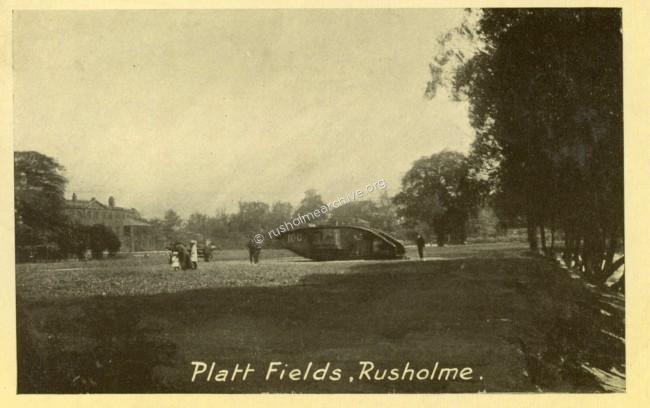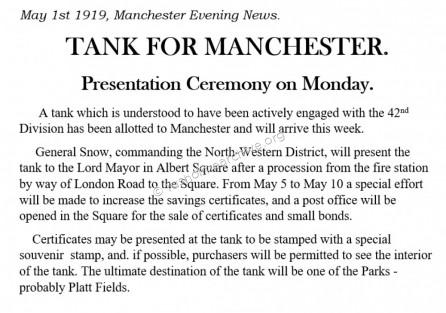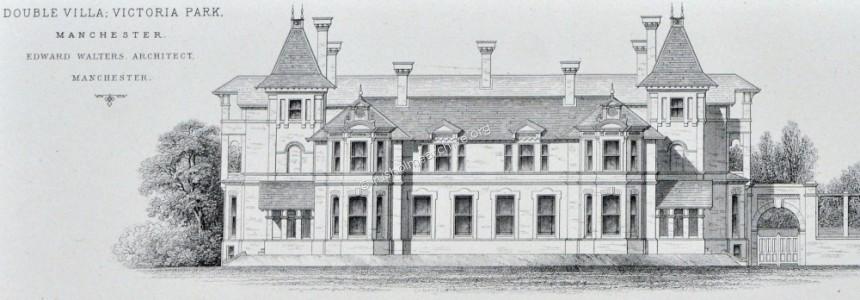Rusholme & Victoria Park Archive
Col. William Coates, M.D., 'This Grievous War'
During the 5 or 6 years that I have been building this website I have come across small ‘snippets’ of information about how Platt Fields, (and Hall) were used during WW1. However, information has been difficult to find probably because of ‘DORA’.
Within a few days of the outbreak of WW1, (4th August 1914), the Govt enacted legislation known as ‘DORA’. The following notes in italics are from Wikipedia,
“The Defence of the Realm Act (DORA) was passed in the United Kingdom on 8 August 1914, four days after it entered World War I. It gave the government wide-ranging powers during the war period, such as the power to requisition buildings or land needed for the war effort, or to make regulations creating criminal offences. The law was designed to help prevent invasion and to keep morale at home high. DORA ushered in a variety of authoritarian social control mechanisms, such as censorship. It imposed censorship of journalism and of letters coming home from the front line. The press was subject to controls on reporting troop movements, numbers or any other operational information that could be exploited by the enemy.
The impact on the effective ban of reporting various local events does rather hamper research, particularly from the local Manchester newspapers. Three items that I have found in respect of Platt Fields, and another regarding Platt Hall are interesting small items of local history that are worth recording.
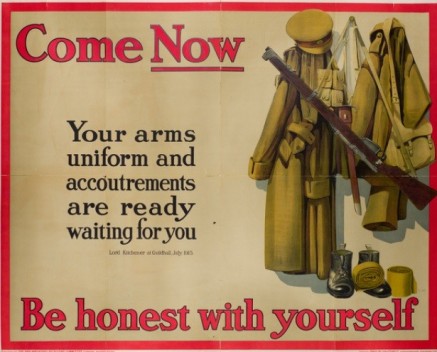
© IWM (Art.IWM PST 5072) http://www.iwm.org.uk/collections/item/object/20994
In the photograph below, dated August 12th 1914, there is obviously military activity in Platt Fields; an article published in the Manchester Courier on August 14th describes what can be seen in the photograph. I would of thought that this might have come within the remit of Dora and censorship, but perhaps at this early stage in the war there was more interest in talking about the need for volunteers with good dentures!
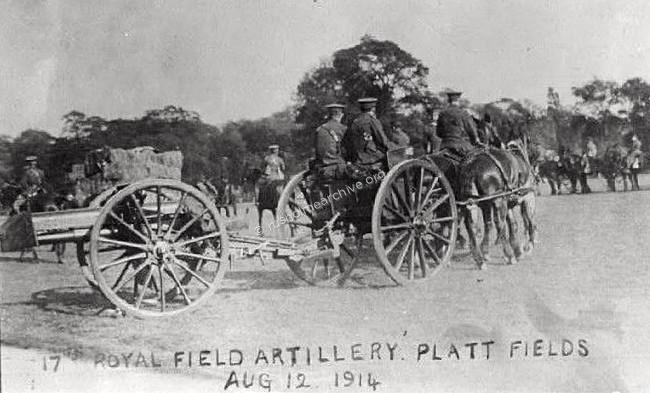
The Platt Fields Camp, Manchester Courier, Aug 14th 1914.
Public interest in the encampment of the 2nd Brigade of the East Lancashire RFA at Platt Fields showed no signs of abatement, and during the whole day crowds were continually filtering through the park watching the men at their work among the horses and guns. The whole of the Brigade – 680 men, 500 horses, and 12 guns with ammunition – is now quartered there.During the day, General Douglas, the General Officer commanding the East Lancashire Division, and Brigadier D’A King, commanding the divisional artillery, visited the camp and saw the men at work.
As many recruits for the Army are now being rejected on account of decayed teeth or deficiency of teeth and are applying at the Manchester Dental Hospital for treatment to enable them to become efficient, it is important that applicants should take note of the following;
1. No applicant can be attended to unless he produces a certificate from the examining medical officer at one of the official recruiting depots.
2. Artificial teeth cannot be supplied unless the applicant or his friends can make a contribution of 15 shillings towards the cost of materials.
3. Applicants may apply on weekdays between 9 and 1 and 2 to 5; Saturdays, 9 to 1.
"The Committee of the Dental Hospital invite subscriptions from the public to help them in this work. They would also welcome subscriptions which would also enable them to supply artificial teeth to such of the recruits as have been rejected for want of teeth.”

© IWM (Art.IWM PST 5080): http://www.iwm.org.uk/collections/item/object/28387
Establishing this camp in Platt Fields at the outbreak of the war was not without some friction with the military authorities. The Parks Committee considered the following correspondence during committee meetings in the autumn of 1914.
SANITARY ARRANGEMENTS FOR TERRITORIAL CAMP.
The City Architect reports that at the beginning of August he received an urgent request from Lieut. Col. Sowler, Commanding the Manchester Artillery, to erect temporary privies, urinals and washstands for the use of the Territorials then in camp at Platt Fields. He accordingly gave instructions to Messrs. George Ryder & Son, of Wilmslow Road, Rusholme, and the work was proceeded with immediately. Messrs. Ryder's account for this work amounting to £29. 11. 4 was forwarded to Lieut. Col. Sowler on the 19th inst., and the City Architect submits herewith copy of correspondence which has passed on the matter, together with the account.
HENRY PRICE,
R.S. City Architect.
October 1st. 1914.
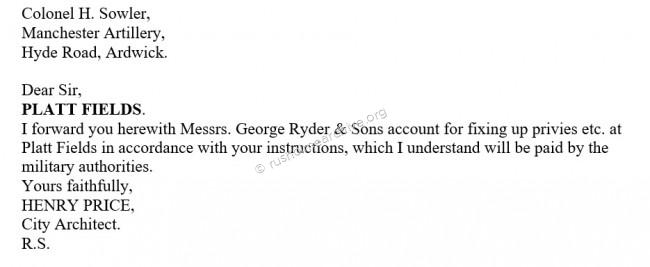
Colonel Sowler was very indignant about this request for £29.11.4d and below is his reply!
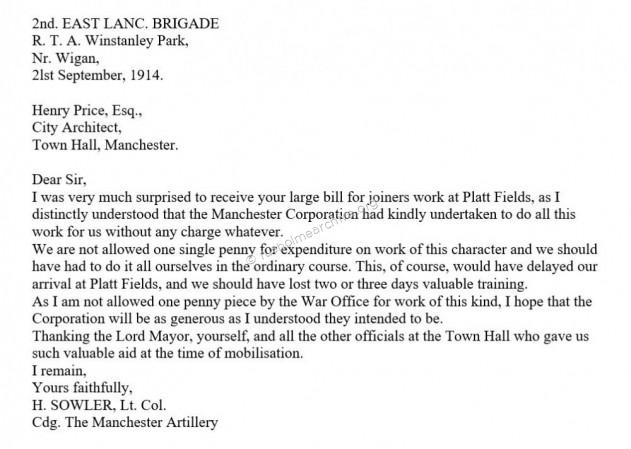
The City Architect sent a tactful reply…………………….
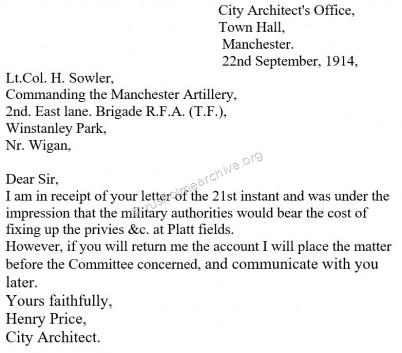
At the next meeting of the Parks & Cemeteries Committee there was a memo headed;
'Conveniences for the Military in Platt Fields’.
The City Architect was present and after some explanations it was noted that the Chairman of the City Councils General Committee was responsible for advising the Military Authority that,
'Every facility would be afforded to the Military Authorities for the use of Platt Fields if they so desired'.
The Parks Committee duly resolved to authorise the Treasurer to pay George Ryder the sum of 29 pounds, eleven shillings and fourpence!
When we read the about the dispute regarding the cost of the work, £29.11s.4d, it is worth remembering that it was just over a century ago when values were very different. Using the quite remarkable website, ‘Measuring Worth’, (https://www.measuringworth.com/), you can bring up to date the values of that seemingly modest sum of £29/11/4d. RPI indexation alone increases the figure to £2,559.00, and if you use labour cost inflation it amounts to £9,515.00, – no wonder Lt. Col was very concerned!
Manchester University Officer Training Corps.
At the beginning of January 1915, the Officer commanding the Manchester University Officer Training Corps, Major Thomas Henry Holland, sent the following letter to Mr Pettigrew, Parks Superintendent.
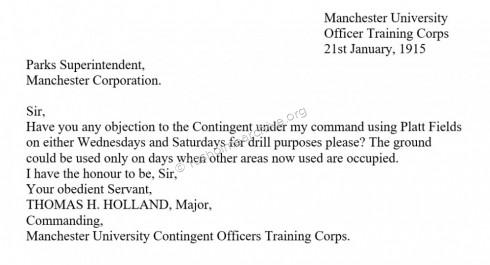
Major Sir Thomas Henry Holland, KCSI, KCIE, FRS, FRSE, LLD, 1868 – 1947 was a force to be reckoned with; biographical note from Wikipedia.

The Parks Committee did not hesitate and formally resolved in the Minutes;
“That the assistant to the General Superintendent be instructed to accede to the application now made.”
The photograph below was taken in 1917 and shows a group of young students who were part of the Manchester University Officer Training Corps. The photograph was taken at the sports pavilion in the grounds of ‘The Firs’, Fallowfield, at the university playing fields. There was also, I believe, a German prisoner-of-war camp in the same grounds.
The photograph identifies a group of just over 70, there were at varying times between 250 – 300 officer cadets, during WW1 just over 300 died on active service. As this photograph was taken in 1917 you might wonder if they did see active service and return to finish further studies?
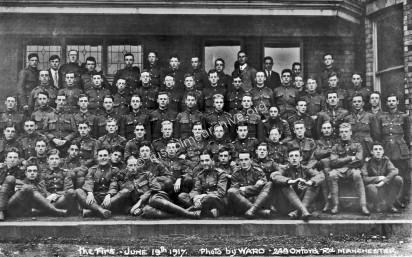
Belgian Refugees.
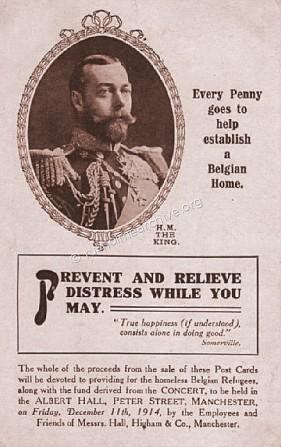
I can only imagine that the following matter had come about because the newly appointed General Parks Superintendent, Mr Pettigrew had been inspecting the various properties and parks that he was now responsible for.
At the September meeting of the Parks & Cemeteries committee the members considered a letter that had been sent to one of its members, Alderman Ashton.
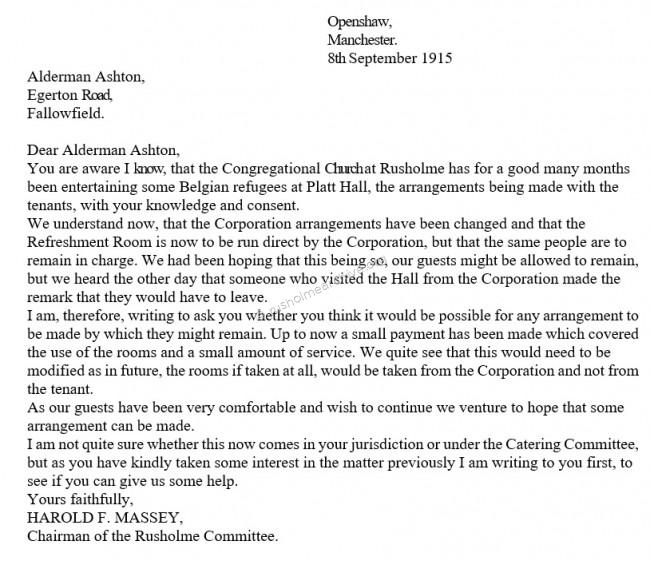
The Committee were clearly unhappy with this ‘informal’ arrangement by the tenant who had been managing the refreshments on the ground floor at Platt Hall.
Prior to the billeting of the Belgian refugees at Platt Hall another memo in the Committee minutes had already determined that all catering arrangements in the Parks would be under the direct control of the Parks Committee.
Following the letter from the Rusholme Congregational Church committee there was a clear resolution in the Committee minutes;
‘That no tenants in any of the houses in the Parks be allowed to sub-let any portion of such premises to lodgers nor undertake any catering for the public without the sanction of the Committee’.
The reply from Harold Massey of the Rusholme Congregational Church seemed to be quite fair, asking for a little leeway about how soon the Belgian refugees would have to leave.
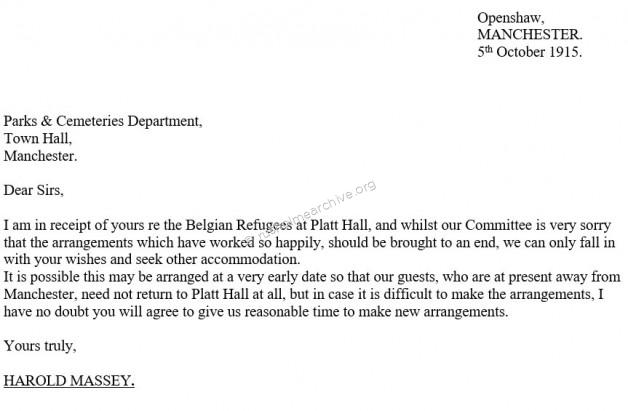
Surprisingly the Parks Committee were not sympathetic to this request;
Memo
‘That the Committee cannot see its way to comply with the request made in the letter now read and that a reply to this effect be forwarded by the General Superintendent’.
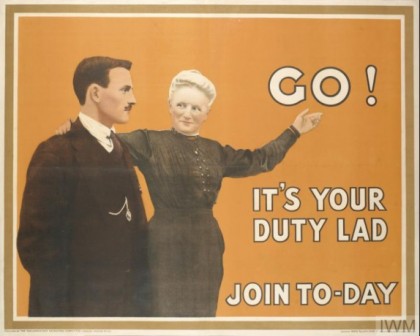
© IWM (Art.IWM PST 5162) http://www.iwm.org.uk/collections/item/object/28450
Platt Fields Hospital 1915.
On another page on rusholmearchive.org I have written about some of the Military Hospitals that were established in Rusholme. One project not realised was to build on Platt Fields, a hutted hospital for (initially), 500 wounded men – however the plans that were discussed and submitted to the City Architect and City Surveyor envisaged this hospital expanding to accommodate 3000 men.
The letter below, dated 18th October 1915, was a formal letter outlining the medical needs of the Military Authorities.
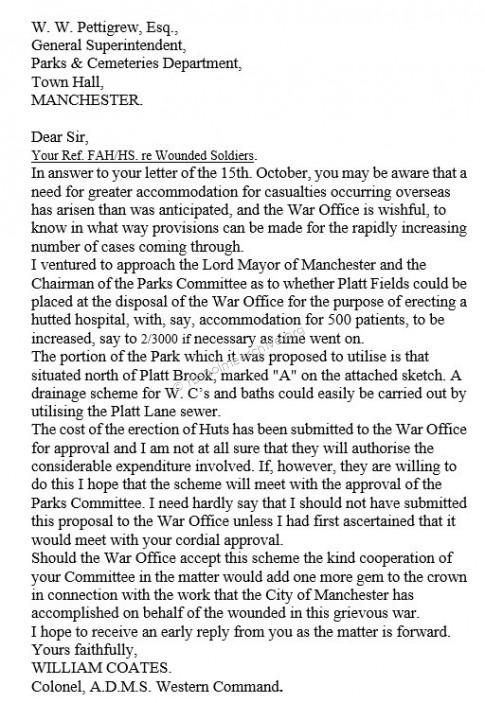
The plans were sufficiently advanced to the point that the City Surveyor was advocating the sewage outfall would have to be linked into the Wilmslow Road mains as the Platt Lane system would not be adequate. However, after several months of discussions the overall cost was considered too much and the letter below brought closure to the planned hospital.
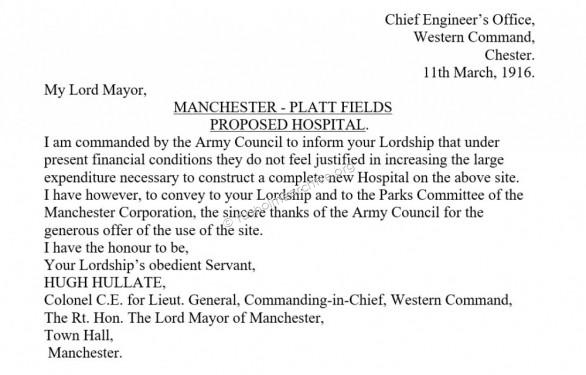
Trenches in Platt Fields 1916 -18
Within two months there was further activity in Platt Fields that seems to be well documented, I have found the following information from the Manchester Parks Committee 1916 minutes.
On May 10th 1916 the Parks committee considered the following letter from Captain Higham, Administrative Centre, 8th. Bn. Manchester Regiment, Ardwick, Manchester
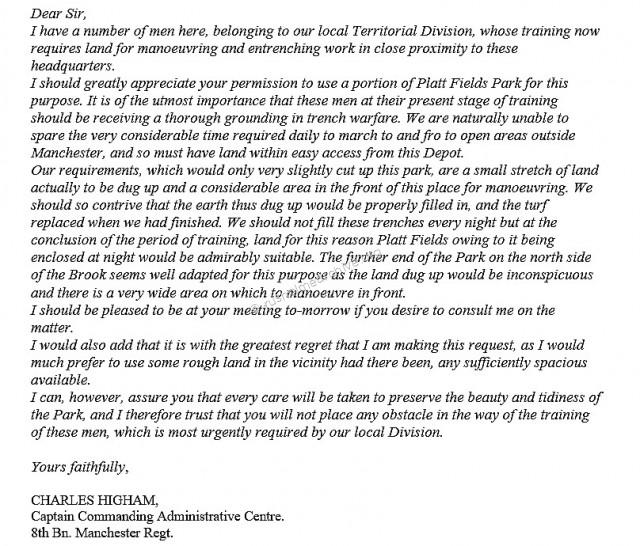
The Parks committee duly considered the matter and appointed a sub-committee to meet with Captain Higham; there seemed, however, to be a feeling amongst committee members that land in Levenshulme at Green Bank Fields would be more suitable.
At their next meeting, they considered the following note from Cllr Tom Fox:
“The Deputy Chairman reports that the Special Sub Committee met Captain Higham at Green Bank Fields on May 13th. 1916, but as he was not satisfied with the conditions existing there the Committee proceeded to Platt Fields to consider any suggestions he had to make. After going very fully into the question the Sub Committee feel that they are only justified in recommending that the Committee adhere to a suggestion made at the last meeting viz: to set aside a portion of Green Bank Fields for this purpose.
On behalf of the Sub Committee,
TOM FOX,
Deputy Chairman of the Parks Committee.
24/5/16.
This suggestion certainly did not meet with agreement from Captain Higham and he sent the following letter to the Chairman of the Parks Committee on the 31st May 1916.
Dear Sir,
I note your remarks relative to the digging in Platt Fields.
May I point out that it is absolutely essential that we should get land for this purpose very much nearer than Green Bank Farm. Under the impression that the rough ground at Ash Fields would not be objectionable to you I have already made a start in this place. This appears to have been a mistake.I have, therefore, had to lengthen the soldiers working day by two hours in order to allow for the time marching to their present digging place, 'pending your early decision’.
This extension of the time is a great hardship on the boys, and will undoubtedly swell the sick parade, as not only is another two hours a day too much on the present programme, but a proper meal cannot be obtained in the middle of the day; a very important point with men fresh from civilian employment.
Altogether I do not know of a more convenient piece of ground, except of course the football pitches in Platt Fields, and as you do not desire these disturbed I hope you will assist us by sanctioning the not very large amount of rough land required at Ash Fields.
I am, Sir,
Yours faithfully,
CHARLES HIGHAM,
Captain,
Commanding Administrative Centre,
8th Bn. Manchester Regiment.
The Parks Committee duly resolved that:
“That under the direction of the Deputy Chairman and Alderman Ashton and subject to such conditions as they may consider desirable, the sanction requested by Captain Higham in his letter, of the 31st, be given.”
Some ten weeks later the following letter, dated 18th August 1916, was sent on behalf of Captain Higham and in due course the Parks Committee considered the proposal at their Sept. meeting.
Dear Sir,
It has been suggested to me that the trenches made at Platt Fields Park by the boys at these Headquarters might be utilised for the purpose of raising money for charitable purposes, such as the Blinded Soldiers and Sailors Fund.
We have already been instrumental in raising about £600 for this fund, which is a most deserving cause.
We shall be pleased to exhibit these trenches provided you are prepared to defray the cost of enclosing them. A considerable sum, however, would be required for ready money expenses, and the sum of £50 would be entailed.
If this scheme were properly worked I do not see why a very handsome sum should not be raised for this charity.
H. North Hunt,
2nd. Lieut., for Captain.
18th August 1916
The report below appeared in the Manchester Evening News on the 15th September;
The Ashfield Trenches.
“The Corporation Parks Committee decided today, to open the newly-constructed trenches at Ashfield, Rusholme, to the admission of the public. A small charge will be made for admission to the trenches and the proceeds divided between the fund for providing comforts to men of the 8th Manchesters at the front and the Lancashire Soldiers' Comfort Fund”.
With surprising speed the notice below was published on the 20th Sept in the Manchester Evening News, and reported on the 22nd Sept in the Guardian and the 24th in the Sunday Mirror, both articles being accompanied by photographs.
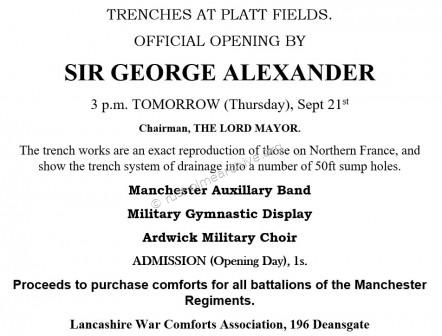
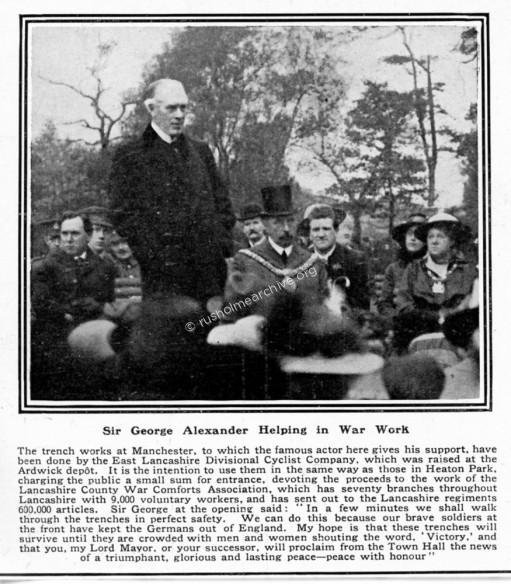
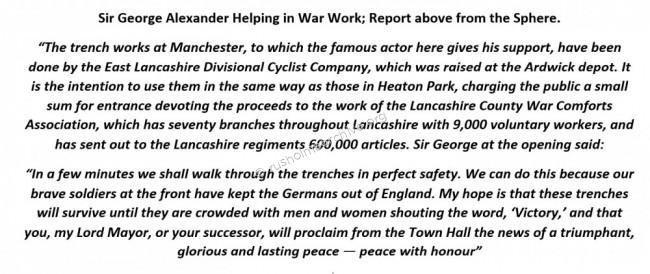
(Sir George Alexander, 19 June 1858 – 15 March 1918, born George Alexander Gibb Samson, was an English stage actor, and theatre producer).
The photographs below were sent to me by Tim Burdett who has kindly allowed rusholmearchive.org to display the images. In the two images, it is very clear that men are digging trenches.
Tim told me that they had belonged to his grandmother who said they were taken during WW1 and that her husband, (amongst others) were “Digging trenches in Platt Fields”!
I know from a report in the Manchester Guardian, that the trenches were situated on a 10-acre plot of land adjoining the Unitarian Chapel and this was particularly wooded. This land had been acquired by Manchester Council in 1912 and added to Platt Fields to increase the size of the Park. The site consisted of two plots and had been described in the Guardian as follows
“Ashfields was the property of Sir Edward Donner, and the land belonged to Mr Smith-Carington of Grangethorpe House. Ashfield House and grounds were freehold and covered an area of three and a half acres. The plot of land measures seven acres, and is separated from the park by a simple fence. There are 360 fine trees on the land, and the rurality of the scene is enhanced by the presence of a rookery.” (you can read more about Ashfields on the page; ‘Fallowfield Brow’).
It does seem to me that the photographs have been taken in the plot of land described above and are a very valuable part of Platt Fields history. Whilst there is no specific written evidence regarding the subject of the photographs I’m quite prepared to believe the story from Tim Burdett’s mother!
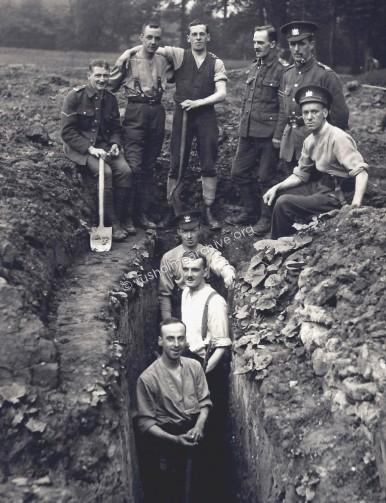
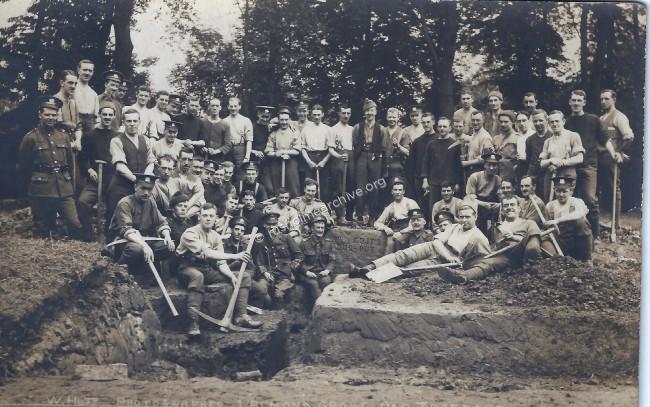
This third photograph that I have and is shown below has a brief message on the rear that refers to the ladies in the picture who provided tea for the troops. Whether this photograph is of men who appear to be digging trenches, (or some other military task that is not identified) but clearly they were in Platt Fields for some military reason ?
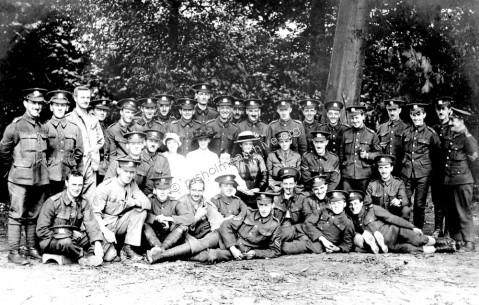
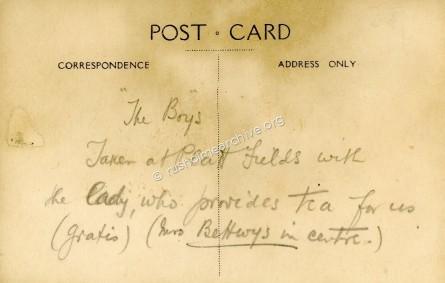
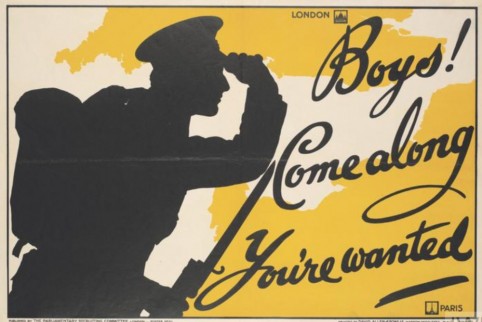
© IWM (Art.IWM PST 5140) http://www.iwm.org.uk/collections/item/object/28430
The aerial view shown below with the Ashfield plot outlined in red, the green line represents Wilmslow Road.
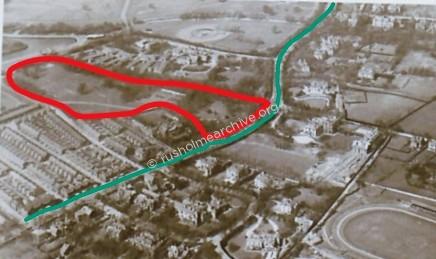
During the first day the cost of admission to the trenches was one shilling, another notice in the Manchester Evening News, (below) dated 6th October 1916 does show the charge had been reduced to three pence……………..
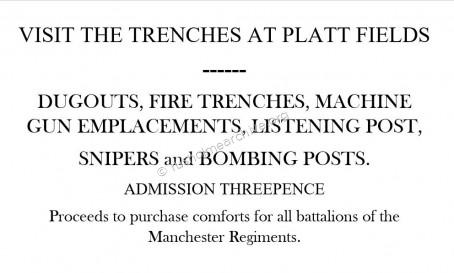
The notice below was placed in the Manchester Evening News on 27th June 1917, true to his usual charitable form Harry Leslie was always prepared to help out!
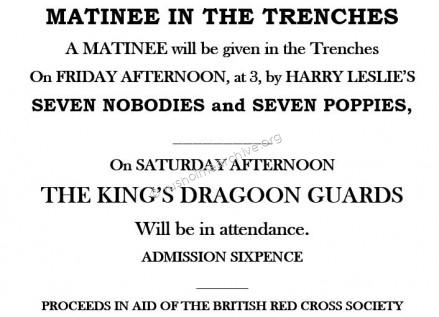
I have searched both minutes of the Parks Committee and the Manchester local press to see if there was any reference as to when the trenches were filled in, but nothing to report about this final aspect of this story.
At this point I thought that it might be appropriate show a photograph of the Parks and Cemetery Committee that was published in the 1915 Parks Annual Report.
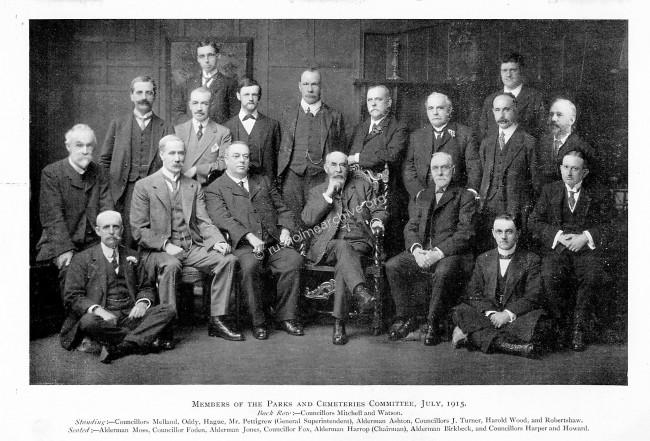
In the photograph, the Chairman is centre, seated in the larger chair, whilst behind him, standing to his left is the General Superintendent, Mr Pettigrew.
'WOGGLES', A Drake for the Lake!!
Whilst the Committee had many difficult decisions to consider I thought the following letter on their Agenda in April 1915 might have come as light relief!
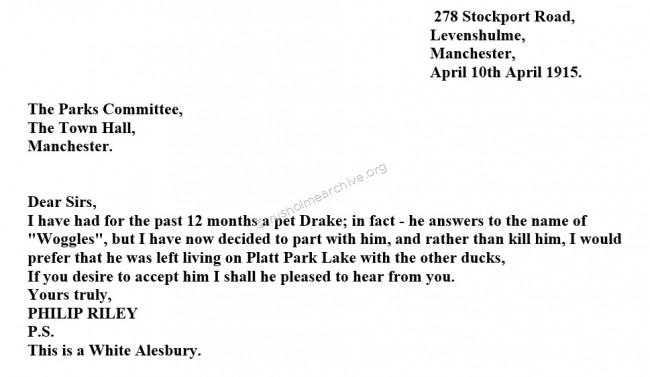
The owner of the duck, Mr Riley was perhaps not very good on his knowledge of duck breeds as his p.s. refers to the bird as a ‘White Alesbury’, when the correct spelling is Aylesbury. I am sure the committee were not concerned about the spelling, they accepted Mr Riley’s offer and the members duly resolved;
“That the offer of a drake for the lake at Platt Fields be accepted and the thanks of the committee be given therefor.”
If you happen to be looking at the ducks on the lake at Platt fields you might just see a descendant of ‘Woggles’……………………….
I thought this postcard below dated 1912 is a suitable picture for the story about 'Woggles'
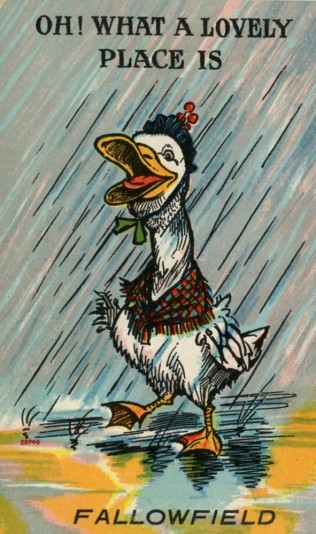
Platt Hall Camp 1916-18.
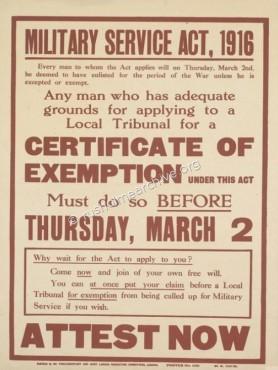
© IWM (Art.IWM PST 5042) http://www.iwm.org.uk/collections/item/object/28359
In the early part of 1916 Manchester City Council was becoming aware that certain basic foodstuffs were becoming scarce and expensive, particularly, according to the Council minutes, “Among the poorer classes”. Sugar, milk and flour was referred to, besides fresh vegetables and potatoes.
In the early part of 1916 Manchester City Council was becoming aware that certain basic foodstuffs were becoming scarce and expensive, particularly, according to the Council minutes, “Among the poorer classes”. Sugar, milk and flour was referred to, besides fresh vegetables and potatoes.
The Council duly set up a sub-committee, ‘The Foodstuffs Special Committee’ with leading members of the Council to take important decisions. By the summer of 1917, a rationing scheme had been set up to cover to cover Manchester, Salford. Stretford, Eccles, Prestwich & Droylesden. Retailers had to list and identify customers who bought sugar, tea, butter, and margarine. The scheme had some faults and by the beginning of 1918 the Government Food Controller, Lord Rhonda introduced sugar rationing on a national basis which allowed everyone a half pound of sugar each week. The scheme was managed on a local basis by local authorities and the ration ticket below had to be produced each time John Wohman went to his designated shop. Mason and Burrows were primarily wine and spirit merchants in Manchester, but having searched Directories I found they had a number of Off-license shops that I presume also sold groceries.
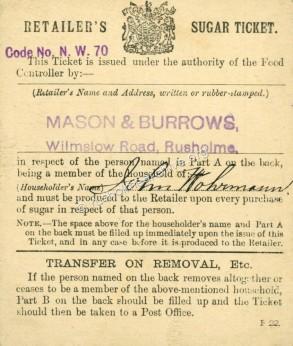
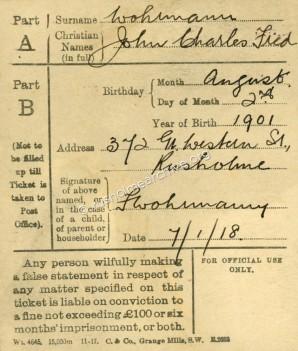
(I searched records for John F C Wohman and I could only find an entry in the 1939 War Register – John Wohman was living in Blackpool with his mother, wife and child, he was working as a clerk for the tram company).
Th e Foodstuff Committee was particularly aware of the acute shortage of labour in the agricultural and horticultural undertakings in Manchester. Raising this matter with the Ministry of Food, there was, as a consequence, correspondence with the Home Office who sent the letter below. It broadly outlined what had become known as ‘The Home Office Scheme’.
(In June 1916, the Government introduced a scheme to try and reduce the numbers of conscientious objectors in prison. All imprisoned conscientious objectors were to have their cases reviewed. Those believed to be genuine would be released from prison, provided they accepted to undertake work of "national importance" under the control of a new civilian committee, in what came to be known as the Home Office Scheme. Any man who refused, or whose plea of conscience failed to satisfy the Tribunal, would be returned to gaol to complete his sentence).
Committee on Employment of Conscientious Objectors
Home Office,
Whitehall, SW.
10th January, 1917.
"Dear Sir,
With reference to your letter of the 8th January,
I enclose a Memorandum showing in detail the arrangements applicable to the employment of small parties of conscientious objectors, but it may be of some assistance if I also state, more broadly than in the Memorandum, the position of affairs.
The Committee is concerned only with conscientious objectors who have failed to secure exemption and, persisting in their objection after becoming soldiers, have been Court Martialled. The War Office in such cases has the question of the objection considered by the Central Appeal Tribunal and, in any case where the Tribunal does not decide against the man, he is asked by the Committee whether he is willing to do work of national importance under civil control. (The words, 'under civil control' should be noted. The Committee, as you will see from the Memorandum, do not allow unrestricted liberty to conscientious objectors, but require them to be under the supervision of a responsible Agent on whom the success of their work in practice largely depends.)
All the men under the Committee are therefore of military age and most of them have been found fit for military service. In the main, therefore, they are well-fitted for employment and many of them are well educated and intelligent. The Committee has employed them, in obtaining road material, making roads, on public work such as reservoirs, and in timber cutting, etc. There is a strong preference among many of the men for work directly connected with increasing the food supply, and the Committee believe that they should can do good work in this direction. You will see from the Memorandum that the authority employing them houses, feeds, and pays them at the cost of the Committee, and credits the Committee with the actual value of the work done.
The Committee are most anxious, for many reasons, to take every opportunity of getting men to work on the land, and sincerely hope you will be able to arrange for their employment. If at any time you would wish to discuss the matter with someone conversant with the manner in which existing schemes of employment are being worked, either I or Mr. Whiskard of the Home Office would be glad to see you or a representative".
The Memorandum relating to the employment terms and conditions for the CO were quite comprehensive and detailed. The following paragraph is the basic terms but in addition there were extensive notes about time off and accrual of leave together with aspects of their detention as military prisoners under civilian control.
“The Committee are paying the standard rate of wages in respect of the services of these men, and the Committee, in addition to housing, feeding, and clothing the men, pay them 8d.** a day and provide, where necessary, allowances for their wives and children.”
(In reality the only provision for the families of the men was a very small allowance granted on the recommendation of the Poor Law Relieving Officer. In these cases, the men's wages were reduced to twopence per day.)
Once again using the ‘Measuring Worth’ website, the value of 8d a day at 2015 values is below;
(RPI) value of that income or wealth is £1.67
labour earnings of that income or wealth is £8.36
economic status value of that income or wealth is £10.33
economic power value of that income or wealth is £14.42
The Special Foodstuffs Committee considered the employment of Conscientious Objectors and resolved; ‘That under the direction of the Chairman and Deputy Chairman arrangements to be made for the employment of Conscientious Objectors’.
The Special Foodstuffs Committee in Manchester was serviced by Mr William W. Pettigrew who was the General Parks Superintendent. Prior to working in Manchester, he had been Parks Superintendent at the City of Cardiff. There he had been appointed Parks Superintendent at the then very young age of 24. After 23 years in Cardiff he was appointed as the Manchester Parks Superintendent in 1915 and seems to have embarked on his new job with some considerable energy. The salary for this post was £500.00 per annum – a very substantial sum. Later in the year, the following report appeared in the Manchester Evening News on the 27th August, 1917, it was headed; ‘Control of Manchesters Food’.
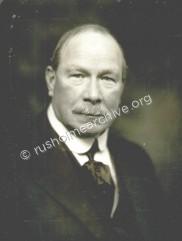
William Wallace Pettigrew, Manchester City Council, General Parks Superintendent, 1915-1932
“The new Food Control Committee of Manchester, which was appointed at the request of the Ministry of Food, is getting to work as rapidly as possible.The members had before them at another meeting, to-day, the important question of the appointment of a chief officer to the committee.
The committee decided to appoint Mr. W. W. Pettigrew, (Park Superintendent) as Chief Officer to the Food Stuffs Committee. While Mr Pettigrew will devote his main energy to the work of the Food Control Depart¬ment, he will continue to keep an eye upon the parks. It is agreed on all hands that a better appointment could not have been made. Since he came to Manchester, Mr. Pettigrew has shown himself not only a capable organiser, but an exceedingly able Corporation servant in many other directions. His work on the Foodstuffs Committee, like that on the Parks Committee, was invariably characterised by a thoroughness which has been beyond criticism. When the appointment was considered at the last meeting or the Committer it, was stated that the salary of the office would be up to £500 a year.”
Meanwhile, at the next meeting of the Special Foodstuffs Committee Mr Pettigrew had matters well in hand as the letter below indicates; he had already sent the letter below to the Parks Committee…………………
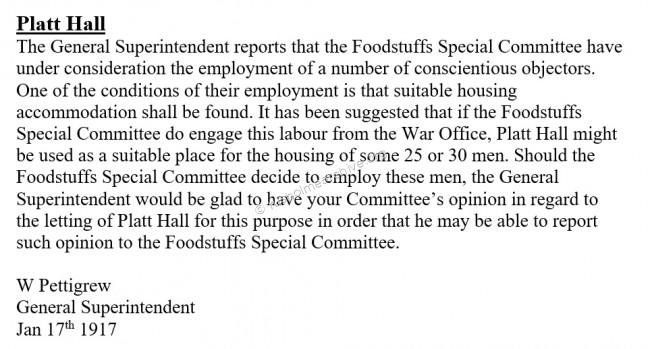
The Parks Committee agreed to the suggestion of Mr Pettigrew, the General Superintendent and resolved;
‘That the General Superintendent be authorised to allocate such rooms in Platt Hall as he may think desirable for the purpose named in the report referred to in the above resolution’.
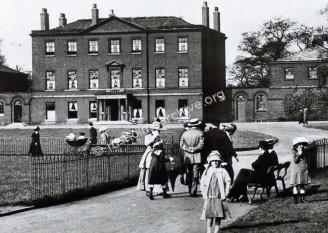
Foodstuffs Special Committee; Conscientious Objectors.
The General Parks Superintendent, William Pettigrew, reported to the Special Foodstuffs Committee;
"As your Committee are aware the War Office has intimated their willingness to supply you with a number of Conscientious Objectors who are agreeable to work on the land. As it would be necessary for you to find suitable accommodation for these men if you engage them, the Parks Committee were, approached with a view to their giving your Committee permission to utilise Platt Hall for this purpose. At a meeting held on the 22nd inst. the Parks Committee agreed to let the Foodstuffs Committee have the use of the Platt Hall - under certain restrictions - in which to house these men.
One of the conditions laid down by the Committee dealing with the employment of Conscientious Objectors is that one person must be made directly responsible to the Committee in London for the oversight of the men sent on to the land in this way. It will be the duty of this person to see that discipline is maintained and that all the conditions of labour are carried out, and that proper accounts of expenditure under different heads are, rendered to headquarters.
If your Committee are prepared to engage the services of the Conscientious Objectors I am already in a position to submit the name of a person who would in all probability be thoroughly competent to carry out the duties devolving upon the Overseer.”
RESOLVED:The appointment of a person to exercise an oversight of the Conscientious Objectors referred to be left in the hands of the Chief Officer.
When I first researched the minutes of the foodstuffs special committee I was confident that the Agent appointed was William Spofforth (he was serving as Agent at the time that Platt Hall Camp was closed).
My assumption was based on a minute dated 18th Dec. 1918, written by the Committee Chairman in which he said;
"In view of the fact that the C.O’ s Camp is being brought to a close, the services of the Agent, Mr. W. A. Spofforth are being dispensed with. As he undertook certain work in the way of Supervising, fencing the allotments etc., it will be necessary for some other person to undertake that work. It is only a part time job and the Chairman suggests that it might be possible to put this work in the hands of Mr. Beal and to pay him a small additional remuneration of say about 17/- per week, which would be charged to the Cultivation of Lands Order Account."
W. MILLARD, Chairman.
However further research took me to Bradford where the Peace Museum had an extensive file on Conscientious Objectors including one from Manchester, Frederick Clarence Crowther.
It was quite clear from the material in the museum that Frederick Clarence Crowther was appointed to the post of Agent and responsible on a day to day basis of managing the Platt Hall Conscientious Objectors Camp.
I should like to take this opportunity of thanking the staff at the Peace Museum in Bradford, for their help and giving rusholmearchive.org permission to publish material about Frederick Clarence Crowther.
Frederick Crowther was born in 1883 in Bradford, Yorkshire. He had settled in Lancashire and at the outbreak of WW1. he was working in the offices of the Co-operative Society in Manchester. Frederick was a deeply committed Socialist, Internationalist and a ‘Co-operator’. His brother died in France in 1916 and anticipating his own call-up to the services he planned to seek exemption on moral grounds. He wrote a letter to friends seeking their help and support.
June 9th, 1916
“In view of the fact that before many weeks have passed, I shall be "deemed” to have enlisted in H. M. Forces.
I am anticipating events.
It is my intention to claim total exemption from Military Service, basing my claim on moral grounds.
As an internationalist I believe that the interests of all workers are identical, and I am opposed to all war as militating against the liberties of the people.
The wholesale slaughter of human beings, accompanied by hatred, and followed by misery and suffering, will not, in my opinion, help to bring about, but on the other hand will hinder, that universal ”brotherhood of man” which so many of us have preached and worked in various organizations for so long.
Holyoake said, “Without honesty to principle there can be no progress in public affairs"
For 14 years as a Socialist and Co-operator I have held these views, and the present conflict has not led me to believe they are erroneous. Judging by the recent decisions in the Tribunals, however, it will be no easy task to convince the gentlemen who sit thereon of one’s beliefs, therefore I am collecting from friends and others as much evidence as possible to place before them”.
Frederick was eventually successful in gaining exemption from military service, however it was conditional upon doing ‘Work of National Importance’.
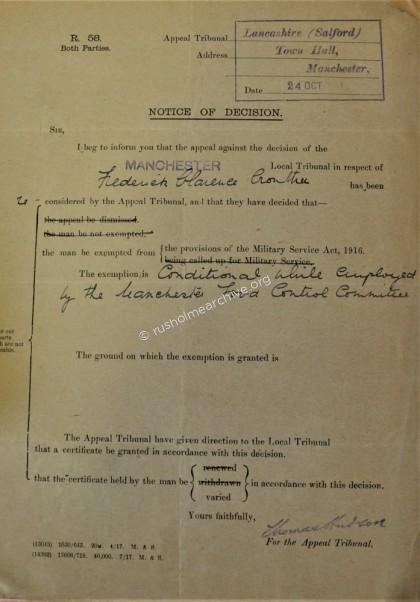
Frederick had volunteered as a lantern operator to help Mr Pettigrew who was lecturing about the value of allotments and raising poultry. It was this connection that I suspect was how Mr Pettigrew saw Frederick Crowther as the right man to be the Agent to manage the Platt Hall C.O.’s. The document below is the invitation for Frederick to attend an interview, (with some very small written notes about that procedure added by Frederick at a later date?)
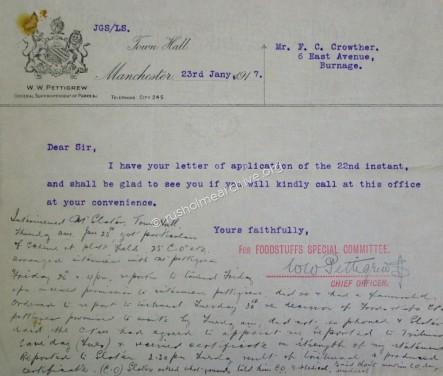
Not long after his appointment Frederick Crowther must have sought advice from at least one other agent about to manage the camp. Amongst the papers held by the Peace Museum is a reply from Mr D A Howells, the Water Works Engineer at Llanelly, Wales. The letter was rather poorly typed with a worn ribbon, so I have transcribed the letter to ‘Word’ for ease of reading, (I have shown the headed paper below). I am sure that the tone of the letter from Mr Howell did not accord with Fredericks view of how he would manage the Camp, but the letter does probably reflect the opinion of a large section of the population.
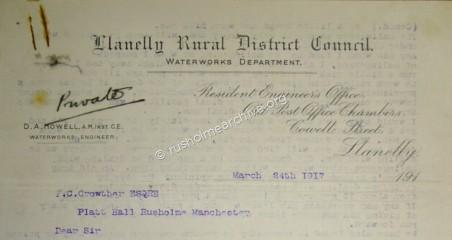
F C Crowther Esq
Platt Hall
Rusholme
Manchester March 24th, 1917
Dear Sir,
I am in receipt of yours of the 12th inst. and note what you say. I do not know what class of work the C.O.’s you have are engaged upon but I would advise you to be very careful not to give in to them at the start otherwise you will have trouble.
The men with Socialistic tendencies are the worst to handle. The religious objectors are alright.
We are working our men 56½ hours per week i.e. 10 hours per diem and 6½ on Saturdays. We are engaged on pick and shovel mostly and our work is very arduous, but we have succeeded in knocking the men into shape. Our policy really in this camp is to look indifferently on petty offences if the man works really well but as soon as he commences to malinger, we make use of the rules by imposing stringent disabilities on the man such as fining him for each little offence until he sees that it is better for him to work with us rather than against us.
Leave. A common practise is for a man to overstay his leave. We always now get a man’s word of honour before allowing him leave and unless the man is a very good man to whom we wish to show extra kindness, we only allow leave when it suits us – i.e. when the work conditions admit of leave. We also try and arrange to grant leave when there are other holidays such as Easter, Christmas etc. We punish for non-return from leave for time to time, this is a very common offence.
Insolence. I regret that we get cases of this from time to time. I also fine to the full amount I am entitled to, (4/8d) for each case of this offence given to my staff which is in my opinion a serious offence.
Malingering. I have a lot of trouble over this. What I do is to detain a man in his quarters, refuse to allow him out of his bed, give him plenty of opening medicine; (Bitter aloes and quinine etc) and as little food as I can – only a cup of cocoa or a little bread and warm milk. The malingerer soon gets very hungry and will soon get out to work under this treatment.
Any man who I find to be malingering or whom I suspect of malingering, I also order out to work straight away and I prefer to run a little risk of ordering a man who is perhaps ill out to work rather than give him the benefit of the doubt if he has been previously caught malingering. You in Manchester, being near a doctor however can make better use of medical facilities than we can who are 10 miles from the nearest medical man.
I would advise you to get a man seen immediately if he reports ill and get a certificate from the doctor as to whether he is fit for work or not. If the doctor finds him fit, order him out. I have no doubt but that you will find some doctors different to others as to dealing with men. The doctor must be used to dealing with malingerers otherwise he will be taken in by them. An old army doctor’s method are the best in my opinion. We have by stringent dealing with malingering reduced our sick lost time from about 13 per cent to less than 4 per cent by this method.
If any man overstays his leave we make a point about being very chary of giving him any more leave without some good reason being put forward.
We have also found it necessary to return some men to the army or prison from time to time by reason of such charges brought against them as “General laziness”, “refusal of duty”, “general insolence to foremen”, “absconding from the work” etc, etc, “Leading or trying to cause trouble by striking”. We had a strike in November due to refusal of men to work in wet when ordered to do so by me. The men struck for a week but returned to work after arrest of six was decided upon. The arrests were carried into effect afterwards however.
I always find it pays in dealing with these men to give them everything you promise whether it is good or bad:- i.e. if you promise any little advantage to them provided they do something well, let them have it and also if you have occasion to threaten a man or a section of the men if they do a certain thing again after warning and they persist in ignoring your threat, put it into force at once and they will soon stop that game. We find that at the commencement they will try how far they may with impunity go and when they see that it does not pay them to play any pranks, they will be alright.
For example, I issued some time ago an order stopping smoking on the work, the men laughed at the order. The following day a man insisted on pulling out his pipe and smoking when commencing work in the morning. The ganger reported him and I promptly fined him 4/8d the max fine. That soon stopped his smoking.
Pay. We pay our men once a fortnight. We also pay ration-money while on leave each fortnight.
Rules. We put all the Committee’s rules into force at our camp. With regards to being late at night we order our foreman to maintain a watch say one night per week with the object of catching men who are late. I allow about 15 minutes grace to men to be in but a man who is consistently late always gets into trouble before long as it is that class of man apparently that the rules are intended for.
You will find that the men will write over your head to the Home Office. They should supply a copy to you. I always make it a point to make a report to the Home Office with regard to their complaints immediately they give me a copy.
If their point of view is a fair one and their ground is a proper one on which to make a concession to them. Do not object but I always make a point to object to anything however giving them preference over ordinary workmen who would be doing the same work as they are doing now in peace time.
By this I mean working conditions, hours of labour, kind of labour, smoking or talking on the works, insolence or refusing orders.
I always regard these matters as of primary importance and always consistently refuse to meet the men on any complaints they bring up because I consider that they should not be treated differently from what I should treat ordinary labourers, masons, carpenters etc. I make a point of demanding as much work but no more from them as I should demand from a free workman doing the same work. Generally, however the Socialist section have been trying to do less work than my requirements and I have had a deal of trouble in breaking them into work.
It is absolutely necessary to deal with them with a firm hand but on the other hand it always pays to be absolutely fair with them.
When you report a man to the Home office and require his removal bring up a strong case against the man. If your complaint is a general one, you need not bring up specific complaints as the man probably will try to argue out of such specific case. When I require a man dismissed or sent to prison for laziness, insolence or other general complaint, I bring up a general charge of incompetency, not trying to work and simply ask the Home office to remove the man from the camp on this ground and on the ground that the man is not trying to do his work properly. I find that it is absolutely essential, to get the best work out of them, to ask the Home office to get rid of a man now and again for reasons similar to the above. I give a man two trials and when for a third time he is charged with laziness etc. by a foreman, I always ask the Home office to get rid of him. When I do so I also always consistently object to the Government transferring a man to another camp and ask for his removal to the army or prison. I find that there is no punishment in transferring a man from one camp to another. The only thing to frighten these men is the army or prison, preferably the former.
You cannot work these men by kindness, I have tried it and miserably failed. A good deal of fear has to be instilled into them before you can work them properly.
I shall be glad to give you any further tips you may require. I have had men for about 8 months and have done good work with them and am doing still better at present than ever before and I will give you any information at my disposal as regards working with these men to help you to make your scheme a success. If you care to come to see my camps working please accept this invitation when you can see the works and our system of accounts for the camp in operation.
Yours faithfully
D.A. Howell
I would be surprised if Frederick Crowther implemented the regime that D A Howell had at Llanelly – the diary of Robert Wright referred to below does suggest a fairer management style at Platt Hall. Frederick Crowther managed the camp for just under two years and when he left the Camp inmates must have presented a book to the retiring Agent. The contents of this letter present a wholly different view of the Platt Hall camp compared to that of Llanelly. The following is a letter that Frederick wrote to the C.O.’s.
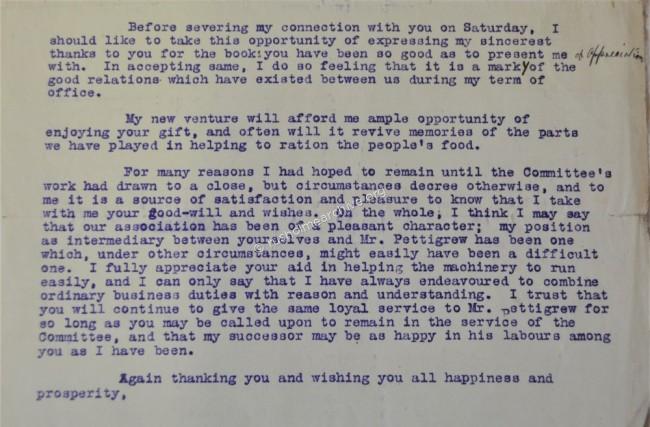
At the end of the war I found the following brief note to the Foodstuffs Committee from Mr. Pettigrew;
CONSCIENTIOUS OBJECTORS’ CAMP.
'Most of the men from Platt Hall have now been transferred to other Work Centre’s under the Home Office and the remainder will be returned on Wednesday next. Instructions have been received from the Home Office to sell all the equipment by auction. The equipment is being scheduled and arrangements made accordingly'.
So, with that brief statement the Platt Hall Camp for Conscientious Prisoners was closed, that small but significant snippet of Rusholme local history could easily have been overlooked if it had not been for the publication of Robert Wright’s Diary.
Perhaps at this point I should mention that I first found a reference to Platt Hall being used as a work camp for C. O’s after reading the diary of Robert Wright
Robert Wright was a Methodist Lay Preacher from Hesketh Bank near Preston. He was a Conscientious Objector, who having been imprisoned at Wormwood Scrubs for refusing to obey military orders, was offered the opportunity of accepting work of ‘National Importance’ under the Home Office Scheme.
Robert Wright had kept a diary throughout most of his adult life and during 1916-18, when he was a C.O., he carefully recorded his experiences, detailing the very brutal treatment that, at times, he had been subjected to. I find it quite interesting that Robert Wright concludes in his diary that his time at Platt Hall was not too disagreeable. I have no doubt that the combination of Frederick Crowther and his sympathetic views must have made the working circumstances amongst the 25 C.O.’s at Platt Hall fairly reasonable. However, Robert does refer in his diary to a disagreement amongst the men that led to his resignation as Chairman of the working group. Not long before his arrival at Platt Hall the following question about an ‘Inmate’ at Platt Hall had been raised in Parliament;
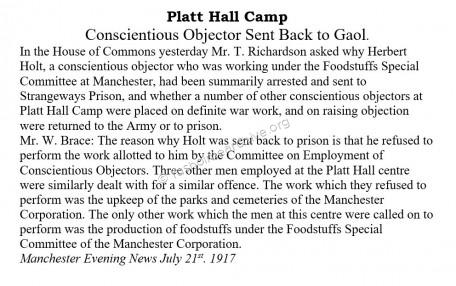
Thomas Richardson, the MP who raised the question was, I think, one of the ILP members who frequently expressed concern about the treatment of Conscientious Prisoners. I have read that Herbert Holt was from a Stockport group of anarchists and a very active member of the No-Conscription Fellowship In an earlier court appearance, he had said that;
“He did not owe anything to England and therefore did not think he should fight for the country.”
Perhaps under Frederick Crowther, the sympathetic Agent, not everything had quite gone smoothly...........
Dr. Jill Barber who edited Robert Wrights Diary has very kindly allowed rusholmearchive.org to reproduce below that which refers to the time he spent at Platt Hall. Dr. Barber has also provided rusholmearchive.org with a photograph, (below), of Robert Wright and his family.
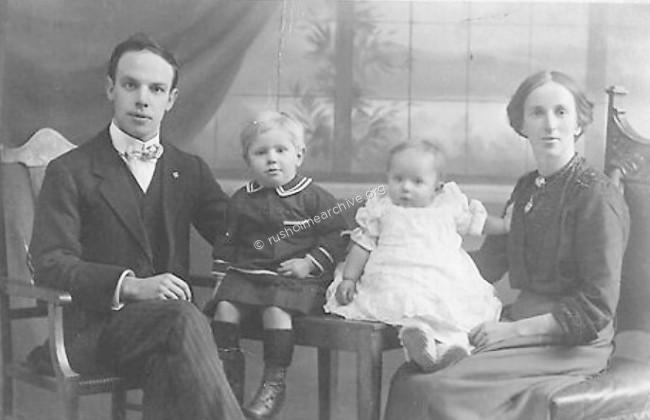
20 Jan 1917: 'This morning at about 10 o'clock our second son Thomas Edward passed away at the age of 9 months 14 days.
The relevant section of Roberts’ Diary follows;
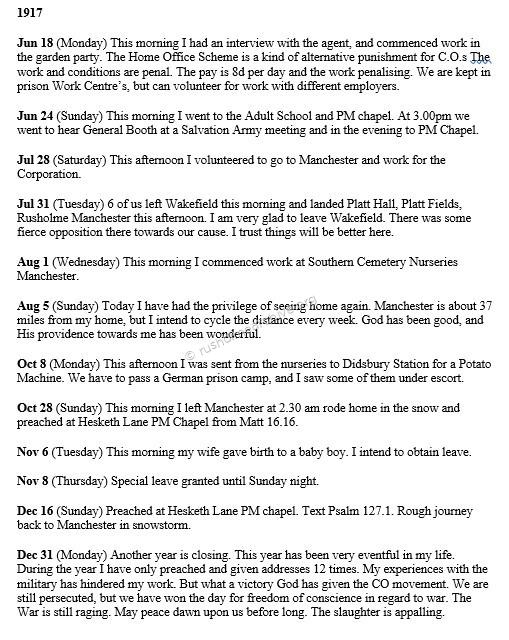
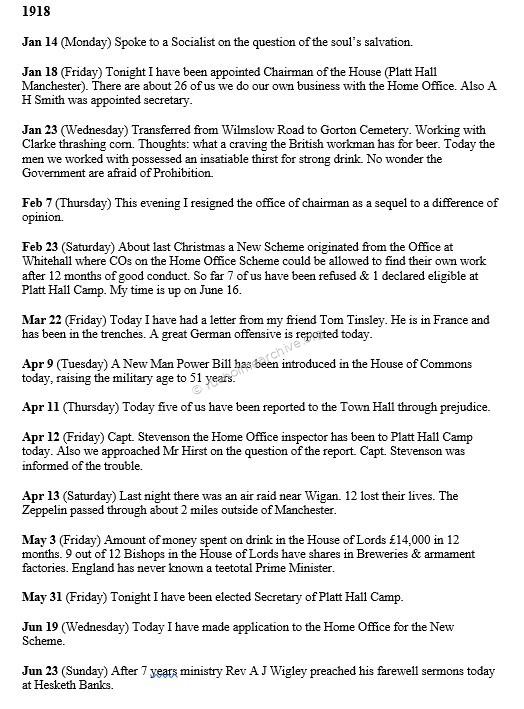
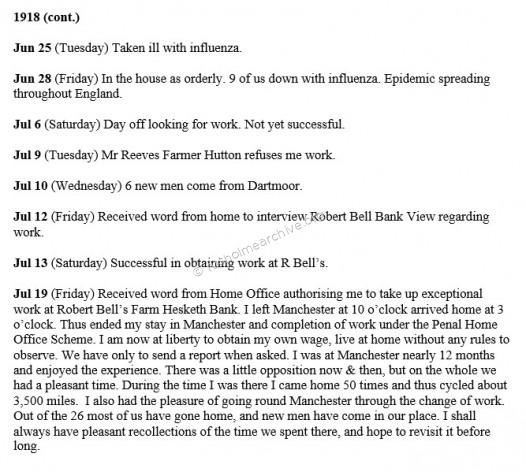
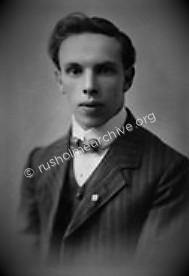
Photo above; Robert Wright (1889-1964), Conscientious Objector and Local Preacher. After the war he led a quiet life, perhaps his experience during WW1 resisting the Military authorities and the state had worn down his spirit, but he served both as Secretary of Hesketh Bank Cricket Club and as a Parish Councillor. During his lifetime, he suffered two nervous breakdowns and very sadly, when he was 74, he took his own life.
Two further aspects of history regarding Conscientious Objectors and Rusholme
Harold Wild was a local man who worshipped at the Wesleyan Methodist chapel on Dickenson Road. However, he too like Robert Wright was convinced that the war was wrong and kept a careful diary which is also available to read online. Again, I would recommend Harold Wild's diary;
It is particularly interesting because he refers to many of the meetings of different pacifist and political groups in the Manchester area.
John Graham (1859-1932), was the Principal of Dalton Hall in Victoria Park, Rusholme. He was a prominent Quaker pacifist who during the War defended local conscientious objectors, and edited the pacifist journal Conscription and Conscience. During the war Dalton Hall and its Principal was something of a beacon to the anti-war movement and the Non-Conscription Fellowship. After the war in 1921 John Graham wrote ‘Conscription and Conscience’. The view of enforced conscription encountered by John Graham is well worth reading, you can easily read a copy by visiting the Internet Archive using this link, choose the format you prefer, (PDF, Kindle etc) and download the book.
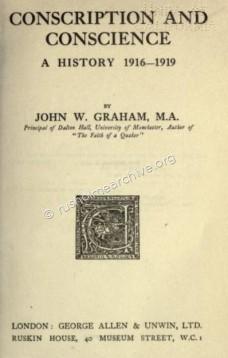
If you visit by Platt Hall you will see a Blue Plaque (below), referring to Charles Worsley whose family owned Platt Hall. I wonder if there should be another plaque, to commemorate those Conscientious Objectors who were billeted at Platt Hall and who bravely resisted the Military authorities and endured so much public opprobrium.
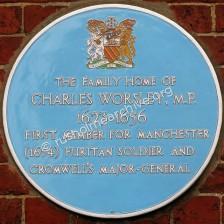
The five recruitment posters displayed on this page are courtesy of the Imperial War Museum. There is a remarkable collection of WW1 Recruitment posters that can be viewed on-line by following this link
In preparing this page I would like to offer my appreciation to the following for their help and agreeing to allow rusholmearchive.org use of their material. Staff at the Peace Museum, Bradford,
Dr Jill Barber at My Primitive Methodist Ancestors for giving permission to use the diary of Robert Wright; Tim Pettigrew for a photograph and other information about his great-uncle, William Wallace Pettigrew; Tim Burdett for loaning the photographs of the soldiers digging trenches and last but not least staff at Manchester Central Library Archives who steered me in the direction of the Parks and Special Foodstuffs Committee minutes – helpful and courteous they even carried the heavy and dusty minute books to the reading desk!
A final PS. I recently found the following postcard, (March 2021) and thought that it would be a suitable footnote.
